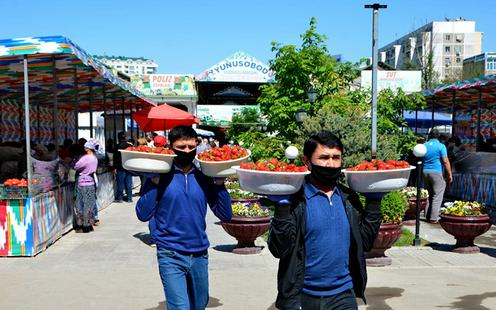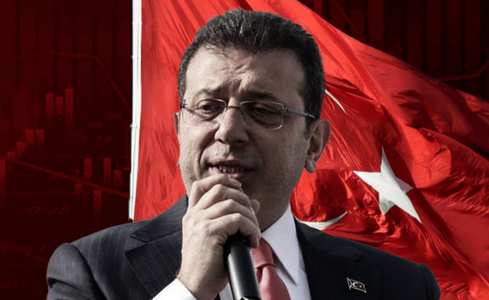Between 10 July and 1 August, Uzbekistan is to reintroduce nationwide lockdown measures. Non-food markets and large stores are to be closed, as are cafés, restaurants and parks. All entertainment events will be banned, together with wedding celebrations, and major transport restrictions will be put in place. The decision was announced today by the government’s coronavirus taskforce on account of the rising number of coronavirus cases and deaths.
During this period, all sports centres, gyms, swimming pools, kindergartens, sanatoria, boarding houses and children’s summer camps are also to be closed, and no kind of study circles or courses may be held. People over 65 years of age are forbidden from leaving their homes (except in cases of necessity) and all others are forbidden from moving around in public in groups of more than three people.
Transport between the country’s regions will be prohibited, apart from the private vehicles of companies and groups working in agricultural production. International freight drivers will be required to take coronavirus tests, while the number of scheduled international flights is to be reduced by half.
As many state employees as possible are to be placed on vacation or work from home. Ordinary meetings in both state organs and private companies are banned and video conferences are to be carried out instead. Industrial sites and large construction sites are to continue operations only if they ensure the observation of sanitary regulations and social distancing of two meters, carry out disinfection work and measure employees’ temperatures on entering and leaving work.
Meanwhile, an interior ministry representative has said that only food stores and pharmacies will be permitted to remain open. It is also unclear exactly which restrictions will hold for the use of private vehicles more generally, with an announcement expected to clarify the situation later. The interior ministry spokesman said that residents of the Tashkent region would no longer be permitted to travel to work in their cars, repeating measures from the original lockdown, when special stickers were required for private vehicle use.
After this announcement was made, coronavirus taskforce representative Khabibulla Akilov explained the new measures as necessary in order to avoid a total collapse of the Uzbek healthcare system.
Around 3,000 coronavirus patients are currently being treated in hospitals, he said, while the country’s total capacity is 7,500 beds. If new cases start to be detected at the rate of 1,000 per day then the healthcare system will totally collapse.
The coronavirus pandemic has forced the Uzbek authorities to redeploy existing hospitals as coronavirus wards, with 80% of beds set aside for COVID-19 patients. As a result, people suffering from other chronic illnesses have been left without reliable medical assistance and this has led to a number of deaths. Although there are as yet no statistics on indirect victims of the coronavirus pandemic, this is something that cannot be ignored, Akilov underlined.
In connection with this, doctors and scientists have asked the coronavirus taskforce to reintroduce a strict nationwide lockdown, Akilov explained. Initially they demanded a 28-day lockdown, but the government agreed only to 20 days. Such a period is necessary in order to provide worn-down doctors with some physical and mental respite.
“The current statistics are just those cases we know about,” Akilov added. “The number of asymptomatic patients who are yet to be tested may be two or three times higher. Initially there were no problems with testing. At present we cannot keep up with demand, even though we are conducting 20-22,000 tests a day. Whereas before the results came through after five or six hours, now you have to wait two or three days of even a week. During this time a patient remains among the rest of the population and this leads to an increase in infections.”
Previously, Uzbekistan has changed its approach to COVID-19 infections, allowing asymptomatic patients to recover at home (whereas they were earlier hospitalised), and reducing the quarantine period from 14 to 10 days. Only those returning from countries with severe spreads of the coronavirus will be sent to the vast shipping-container quarantine camp at O’rtasaroy. The rest will be allowed to isolate themselves at home under medical supervision. The same holds for those who have come into contact with confirmed COVID-19 infections.
While the coronavirus situation in Uzbekistan remains relatively benign compared to Kazakhstan and Kyrgyzstan, case numbers have risen significantly since the original nationwide lockdown was gradually lifted starting in May. On 6 July the country set a new record for confirmed infections, with 342 cases detected in one day.










